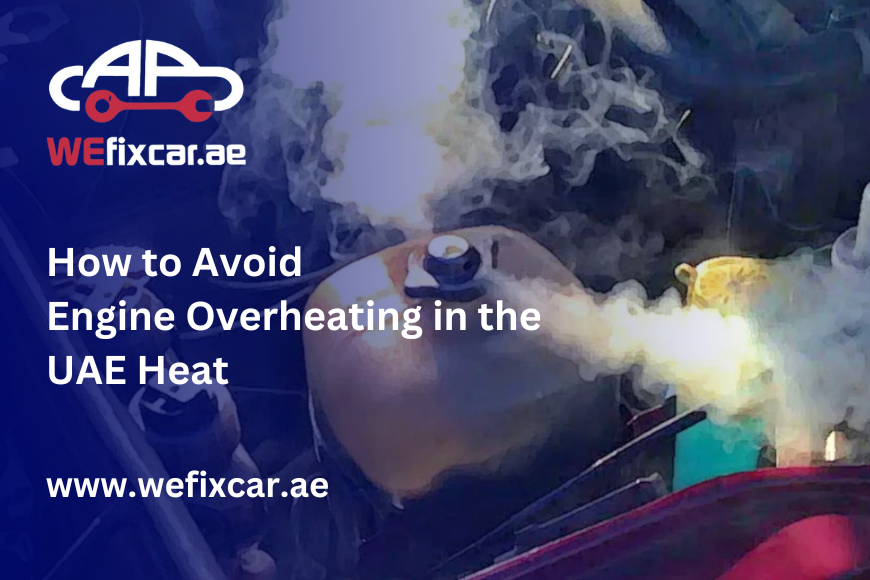How to Avoid Engine Overheating in the UAE Heat
The UAE’s extreme temperatures can put excessive strain on your car’s engine, increasing the risk of engine overheating. High heat, combined with long drives and stop-and-go traffic, can push your cooling system to its limits. If your engine overheats, it can lead to severe damage, including thermostat issues, radiator failure, and even engine breakdown.
To keep your engine running smoothly in the scorching UAE climate, it’s essential to maintain proper coolant levels, ensure efficient radiator function, and follow preventive measures to enhance heat dissipation.
Why Does Engine Overheating Happen?
Your car’s engine generates a significant amount of heat when running. The cooling system is responsible for regulating temperature and preventing overheating. If any component in the system fails, heat builds up, leading to serious mechanical issues.
Common Causes of Engine Overheating:
- Low Coolant Levels – Insufficient coolant reduces heat absorption and circulation.
- Faulty Radiator Function – A damaged or clogged radiator prevents proper cooling.
- Cooling Fan Malfunction – If the cooling fan isn’t working, heat cannot dissipate efficiently.
- Thermostat Issues – A stuck thermostat can block coolant flow, causing temperature spikes.
- Leaking Hoses or Water Pump Failure – Coolant leaks reduce cooling efficiency and lead to overheating.
Understanding these causes helps you take preventive measures before a minor issue turns into costly engine damage.
Essential Tips to Prevent Engine Overheating in UAE Heat
1. Regularly Check and Maintain Coolant Levels
Coolant (antifreeze) is essential for regulating engine temperature. Low coolant levels reduce the system’s ability to absorb and dissipate heat, increasing the risk of overheating.
How to Check and Maintain Coolant:
- Ensure coolant is at the recommended level in the radiator and coolant reservoir.
- Use the right coolant type specified for your vehicle.
- Check for leaks in coolant hoses and the radiator.
- Never open the radiator cap when the engine is hot.
Not sure if your coolant levels are sufficient? Visit We Fix Car for a cooling system check today.
2. Ensure Your Radiator is Functioning Properly
The radiator plays a crucial role in heat dissipation. If it becomes clogged with dirt or suffers from leaks, it won’t effectively cool the engine.
Radiator Maintenance Tips:
- Clean the radiator regularly to remove dirt and debris.
- Check for leaks or damage in the radiator and hoses.
- Ensure the radiator cap is secure and functioning properly.
- Flush and replace radiator coolant as per manufacturer recommendations.
A well-maintained radiator ensures optimal cooling, preventing engine overheating even in extreme UAE temperatures.
3. Inspect and Test the Cooling Fan
The cooling fan helps push air through the radiator to lower coolant temperature. If it malfunctions, the engine temperature can rise quickly, especially in heavy traffic or idle conditions.
Signs of a Failing Cooling Fan:
- The engine overheats in slow-moving traffic but cools down when driving at high speeds.
- The fan does not turn on when the engine gets hot.
- Strange noises coming from the fan motor.
Regular cooling fan inspections ensure it operates effectively, providing extra cooling support.
4. Monitor Your Thermostat for Proper Functioning
The thermostat regulates coolant flow based on engine temperature. If it gets stuck in a closed position, coolant cannot circulate, causing the engine to overheat rapidly.
Symptoms of a Failing Thermostat:
- Temperature gauge spikes suddenly.
- Coolant does not flow properly through the radiator.
- Engine overheats even when coolant levels are sufficient.
Replacing a faulty thermostat early prevents overheating and engine damage.
5. Check for Coolant Leaks and Hose Damage
Cracked or worn-out hoses and water pump leaks can cause a loss of coolant, leading to overheating issues.
How to Detect and Prevent Coolant Leaks:
- Inspect hoses for cracks, bulges, or leaks.
- Look for puddles of coolant under your vehicle.
- Replace old or damaged hoses before they fail.
Regular cooling system inspections help detect leaks before they cause major problems.
Suspect a coolant leak? Get a professional cooling system inspection at We Fix Car today.
6. Avoid Driving During Extreme Heat
Whenever possible, avoid driving during peak temperatures (12 PM to 4 PM) in the UAE. This reduces strain on the cooling system and lowers the risk of overheating.
If you must drive, take breaks, keep the air conditioning moderate, and avoid aggressive acceleration, which generates more heat.
7. Keep an Eye on the Temperature Gauge
Your car’s temperature gauge provides real-time monitoring of engine temperature. If the needle moves towards the red zone, act immediately:
- Pull over safely and turn off the engine.
- Let the engine cool before opening the hood.
- Check coolant levels and look for leaks.
If overheating persists, seek professional assistance immediately.
Frequently Asked Questions About Engine Overheating
How often should I check my coolant levels?
You should check your coolant levels at least once a month and before long trips, especially in hot weather.
Can I use water instead of coolant?
While water can be a temporary solution, it does not provide the same heat dissipation and corrosion protection as coolant. Always use the recommended coolant mix.
Why does my engine overheat even when I have coolant?
A faulty thermostat, broken water pump, clogged radiator, or malfunctioning cooling fan can cause overheating even with adequate coolant. A professional diagnosis is recommended.
What should I do if my engine overheats while driving?
- Turn off the AC and turn on the heater to help dissipate heat.
- Pull over and let the engine cool before opening the hood.
- Check coolant levels and look for leaks.
- If the problem persists, call for professional assistance.
How much does it cost to fix an overheating engine?
The cost depends on the issue. Coolant refills and minor repairs are inexpensive, while radiator replacements or thermostat repairs can be more costly.
Final Thoughts
In the UAE’s intense heat, engine overheating is a serious concern that can lead to costly repairs if ignored. Regular coolant level checks, radiator maintenance, and cooling system inspections are essential to keep your car running smoothly.
By following these preventive measures, you can avoid overheating, extend engine life, and drive with confidence even in extreme temperatures.
Schedule a cooling system inspection at We Fix Car today and stay worry-free on the road!



